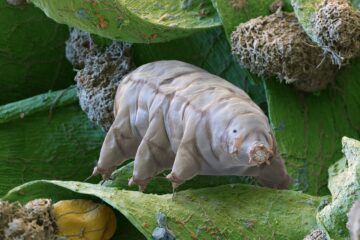Meghan Bartels in Scientific American:
 Tiny tardigrades have three claims to fame: their charmingly pudgy appearance, delightful common names (water bear and moss piglet) and stunning resilience in the face of threats ranging from the vacuum of space to temperatures near absolute zero. Now scientists have identified a key mechanism contributing to tardigrades’ resilience—a molecular switch of sorts that triggers a hardy dormant state of being. The researchers hope that the new work, published on January 17 in the journal PLOS ONE, will encourage further exploration of the microscopic creatures’ ability to withstand extreme conditions.
Tiny tardigrades have three claims to fame: their charmingly pudgy appearance, delightful common names (water bear and moss piglet) and stunning resilience in the face of threats ranging from the vacuum of space to temperatures near absolute zero. Now scientists have identified a key mechanism contributing to tardigrades’ resilience—a molecular switch of sorts that triggers a hardy dormant state of being. The researchers hope that the new work, published on January 17 in the journal PLOS ONE, will encourage further exploration of the microscopic creatures’ ability to withstand extreme conditions.
The research began back when, on a whim, co-author Derrick Kolling, a chemist at Marshall University, put a tardigrade into a machine that detects “free radicals,” or atoms that contain unpaired electrons. And he did see such atoms being produced in the water bear. That finding isn’t surprising because an animal’s normal metabolic processes, as well as environmental stressors such as smoke and other pollutants, create free radicals inside cells.
When they build up, free radicals—most notably reactive forms of oxygen—snatch electrons from their surroundings to achieve stability in a process known as oxidation. In the process, these radicals damage cells and compounds such as DNA and proteins. But in small quantities, free radicals can act as signaling molecules, Hicks says, and her lab studies show how these atoms affect a cell’s behavior by glomming on to and popping off a variety of proteins. When Kolling told Hicks about seeing free radicals in a tardigrade, Hicks wondered if these atoms might play a role in the animal’s hardiness. The team devised several experiments to temporarily expose little water bears to stress-inducing, free-radical-producing conditions—including high levels of salt, sugar and hydrogen peroxide. Under these forms of stress, tardigrades curl up into a temporary protective state of dormancy called a tun. “When there’s a lot of stress, they’re masters of protecting themselves,” Kolling says.
More here.
